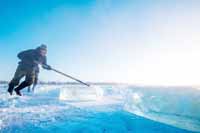
AFP, Oy (Russia) :
Innokenty Tobonov sinks his harpoon into a long block of ice while his helpers expertly push it out of freezing lake waters onto the snow-dusted surface before sliding it towards an idling tractor.
After an hour of cutting ice blocks out of the lake in temperatures of minus 41 degrees Celsius (minus 42 Fahrenheit), cold vapour has frosted his eyelashes.
But this is no excuse for a break as the group hurries to extract a winter’s worth of frozen drinking water for an elderly neighbour.
Yakutia, in northeastern Siberia, is Russia’s largest region and experiences the planet’s coldest temperatures.
Villages like Oy, where Tobonov sits on the local council, rely on such “ice water” for most of the year.
Digging wells is too expensive in this part of the world, due to a thick layer of hard permafrost.
Tap water in Tobonov’s village-drawn from the mighty Lena River-is only usable for around 2.5 months of the year.
Pipes freeze during the long winter, and in spring, when the rivers break, the water is too full of sediment to consume.
Most Yakut villages have no water treatment facilities, making ice the cleanest available drinking source.
It is harvested in November and stored outside during the winter-usually on a raised surface to keep it out of reach of dogs.
As the weather warms, locals move their supply into underground cellars that become natural year-round freezers thanks to their permafrost walls.
“We do this every year,” Tobonov said. “The village needs drinking water.”
He said a small household needs about 10 cubic metres (353 cubic feet) of ice for the winter.
“This is hard physical labour,” Tobonov said, smiling. “The hardest is when the ice is about 50 centimetres (20 inches) thick, it’s difficult to pull it out.”
“We drink and cook from ice water,” said 74-year-old Oy resident Pelageya Semenova after Tobonov and his team unloaded the sparkling bricks outside her house. “It’s very convenient.”
“Ice water is cleaner, and I don’t like the taste of tap (water): in the city it smells like chlorine, and here sometimes it smells like fuel oil.”
“I boil it because I’m afraid (of drinking it raw), though people say that ice water has no vitamins.”

